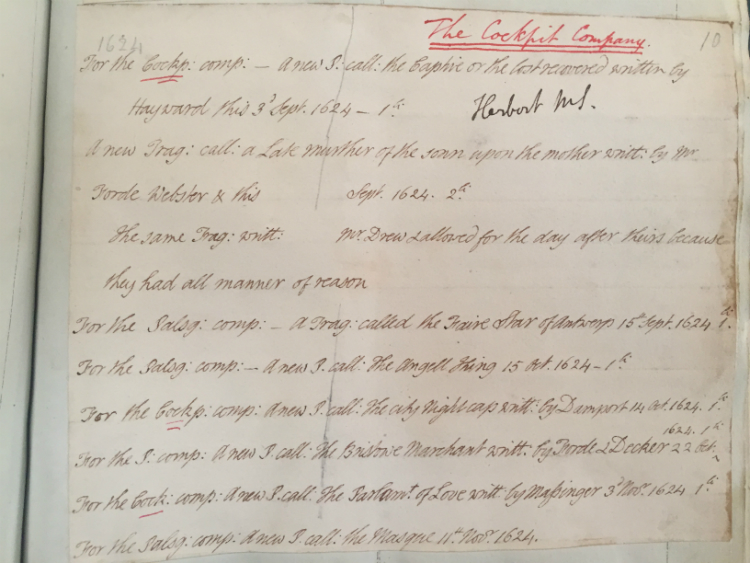Late Murder of the Son upon the Mother
Historical Records
Dramatic Records of Sir Henry Herbert
J. O. Halliwell-Phillips transcribed a number of Sir Henry Herbert's licensing records and compiled them in various scrapbooks now held at the Folger Shakespeare Library. Amongst them is the following transcription of plays from September 1624:

A new Trag: call: a Late Murther of the sonn upon the mother writt: by Mr
- Forde Webster & this Sept. 1624. 2li.
- The same Trag: writt: Mr. Drew & allowed for the day after theirs because
- they had all manner of reason.
(NB. Bentley notes that the fee paid was "double the one usual at this time for licensing a new play. This double fee may be explained by an unusually large number of alterations or by the difficulties suggested by the licence of a second play on the subject by Drew. I take this second licence—which was not copied by Chalmers or Malone—to indicate that two different companies prepared plays on this topical subject at the same time; that Herbert, after hearing arguments, allowed both plays so that they could be acted in competition; that for unspecified reasons he allowed the Dekker, Rowley, Ford, and Webster play a one-day advantage. … [I]t is clear that the subject was thought to have great appeal and that two London companies were competing for the right to exploit it." Bentley 3.253-54).
Theatrical Provenance
<Enter information about which company performed the play, and where/when it was performed, etc.>
Probable Genre(s)
Topical drama; domestic tragedy.
Possible Narrative and Dramatic Sources or Analogues
The murder of Joan Tindall by her son, Nathaniel Tindall
From the records of the Middlesex Sessions, Sisson establishes that “Nathaniel Tindall or Grindall, of Whitechapel, yeoman, murdered Joan Tindall or Grindall on 9 April 1624 in Whitechapel. He came to trial at the Old Bailey at the Gaol Delivery from Newgate, along with Tobias Audley, on Friday, 3 September” (55). The motive was unknown, and there was no record of a Coroner’s Inquest.
Two ballads on the subject were recorded in the Stationers’ Register (see “Historical records” above): “The documents give us very little information about the handling of this tragic story in the play. Of the two ballads, the first only is extant, and it gives no information about the crime” (57).
The extant ballad is The penitent Sonnes Teares, for his murdered Mother (EEBO-TCP, Open-Access), purportedly by “Nathaniel Tyndayle, sicke both in soule and body: a prisoner now in New-gate” (57).
References to the Play
The only unambiguous reference to Drue's play is the licensing record; other discussions of the subject matter (see The Late Murder in White Chapel, or Keep the Widow Waking) may possibly refer to Drue's also.
Critical Commentary
Critics are reluctant to acknowledge that there appears to have been two plays written on precisely the same subject matter; the more famous of the two is second play on this subject, The Late Murder in White Chapel, or Keep the Widow Waking, because it was the subject of Star Chamber attention. Harbage conflates this title with the second play on this subject. Sibley maintains separate entries but confuses the details (attributing the current play to Ford and Webster -- to whom she also ascribes the second play -- without recording Drue's contribution to either).
For What It's Worth
(Information welcome)
Works Cited
Site created and maintained by David McInnis, University of Melbourne; updated 30 March 2016.